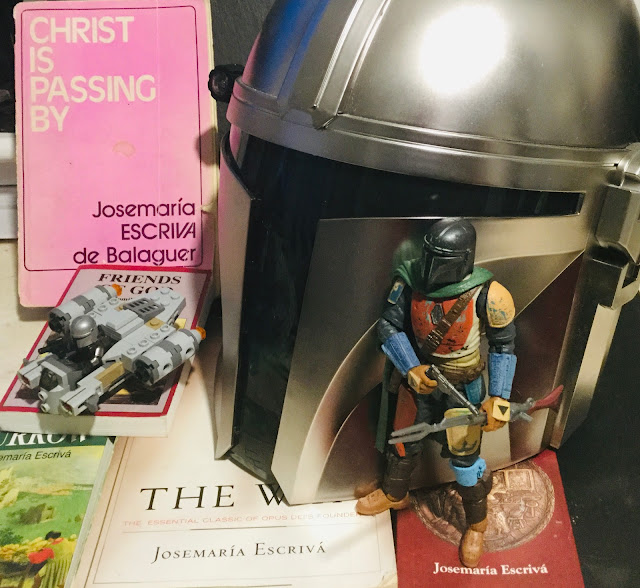This Is The Way
You
may have seen the recent statement from a Church spokesperson urging Scottish
Catholics to “examine their financial priorities,” noting our financial contributions
to the church versus other expenditures, stating “If someone spends more on
Netflix subscriptions each month than they donate to their community, then a
financial reality check is probably in order”.
Personally, I am not a huge fan of
Netflix but I do enjoy Disney+ because it contains all the Star Wars movies and
every single Star Wars TV series episode. Plus, I’ve always felt Star Wars has
something interesting to say about faith and religion.
Don’t get me wrong, there’s
absolutely nothing worse than all those endless lame attempts to make the Star
Wars franchise about Catholicism, as a way to make the faith seem cool and
appealing to the kids. You know the type of thing; ‘Oh the Jedi knights are
just like Franciscans’ or ‘In a way The Force is just like the Holy Spirit’,
and so on.
Having said all that, I am very
excited about the third season of the Star Wars series ‘The Mandalorian’ on
Disney Plus and to be honest, admirers and devotees of Saint Josemaria Escriva
would be quite hard pressed not to notice at least some resemblance between the
founder of Opus Dei and the main protagonist in The Mandalorian ‘Din Djarin’
aka ‘Mando’. As a fan of both The Mandalorian and the life and spirituality of
Saint Josemaria, the similarities between the two seem very obvious.
For example, Mando belongs to a clan
of supposed religious zealots known as the ‘Children of the Watch’, who are
defamed as a cult by their enemies, whereas the Children of the Watch believe
themselves to be the upholders and preservers of the true ‘Way of the
Mandalorians’, having been displaced from their home planet of Mandalore and
scattered across the Galaxy during a war and a purge against the Mandalorians.
Just as St. Josemaria Escriva
established Opus Dei (also unfairly and inaccurately classified as a cult) amid
a purge against the Church during a time of great conflict. Much like the young
Din Djarin and the Children of the Watch, Josemaria and the early members of
Opus Dei, were forced flee from Spain over the Pyrenees and into France as a
refugees during the Spanish civil war.
Fans of the show will be familiar
with the way in which Mando freely submits himself to the strict Mandalorian
Code of Honour which requires his total loyalty to the community but the Code
also provides Mando with a deep sense of worth and purpose, as well as providing him with a clear life
path to follow.
Indeed, Mando’s empowerment as a
Child of the Watch seems to echo St Josemaria’s insistence that ‘We are truly,
through grace, God’s children, we are children of God and nothing and nobody
can ever rob us of that dignity’.
This depiction of Mando as a faithful
Child of the Watch, protecting Grogu ‘The Child’, also matches up nicely with
Opus Dei’s strong emphasis on what they call ‘divine filiation’ or put simply,
the piety of children.
Similarly, the main storyline focuses
on Mando’s devotion to protecting ‘the child Grogu’ or baby Yoda, as he is
called. To me, this plot line is also a reminder of Josemaria’s special
devotion to the child Jesus, there are stories of the Saint praying before the
statue of the Infant and also saving statues of the child Jesus during the civil war,
carrying them around with him, just as Mando carries Grogu.
Much like the theme of childlike faith made present in The Mandalorian,
another important theme running throughout the series, can be found in the motif
of the forge. In the show, the character known as the Armorer forges armour and weapons for her fellow Mandalorians, she plays a vital role in keeping her people's culture alive
after so many Mandalorians have been killed in the purge.
Yet again, we are reminded of Josemaria
Escriva’s words in his book The Forge, in which he describes our soul as being
like a rough nugget of pure gold which must be placed in the forge and
fashioned with fire and hammer until it is turned into a splendid jewel to be
offered up to God.
Interestingly, Mando has a job; he
earns a living working as a bounty hunter, unlike the aforementioned Jedi
Knights. To put it bluntly, if Luke Skywalker and the Jedi order are supposed
to be enrobed cloistered monastics in their Jedi temples.Then the Mandalorians
are like the lay members of ‘The Work’ answering the universal call to holiness,
out in the world, sanctifying the workplace and social environments.
However, the single most striking
likeness between The Mandalorian and the special charism of Opus Dei is found in the
idea of ‘The Way’. Throughout the TV series, Mando and his fellow adherents to the Way, constantly repeat the mantra ‘This is
the Way’ when following its ideals.
Meanwhile, The Way is the title of Josemaria’s best selling seminal masterpiece,
given to us in the form of a series of meditations, outlining the spirituality
and principles of the Opus Dei prelature.
Finally,
anyone who has watched the trailer for the new season of The Mandalorian will
know that series three is all about Mando going on a penitential pilgrimage to the living waters beneath the mines of Mandalore to gain forgiveness for breaking the
Mandalorian code, just as St Josemaria offered up his suffering
on his own difficult journey over the mountains.
So no, I won’t be giving up my
subscription to Disney+, instead I’ll be joining Mando on his journey of atonement
and repentance. After all, this is the way!



